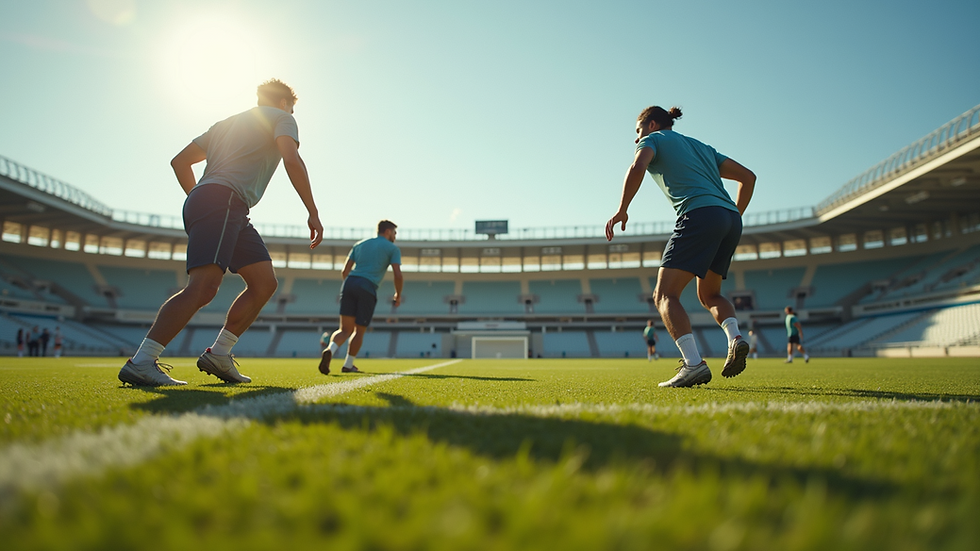The Hidden Price of Superiority and Contempt in Sports Performance
- Dr Paul McCarthy

- Jul 7, 2025
- 4 min read
In the world of sports, the intense drive for victory can overshadow the well-being of athletes. While the desire to excel is natural, many athletes face feelings of superiority and contempt. These emotions may appear beneficial at first, but they can seriously harm mental health, relationships, and performance. Recognizing the toll these feelings take and how they affect sports dynamics is crucial for athletes, coaches, and fans.
The Nature of Superiority and Contempt in Sports Performance
Superiority and contempt are closely connected but originate from different psychological places. Superiority means believing one is better than others, which can push athletes to perform at their peak. However, if this attitude persists, it can lead to contempt, where athletes view their competitors and teammates as less valuable.
This mindset distorts how athletes see their own worth and that of others. Studies show that teams with members who exhibit feelings of superiority often experience higher rates of conflict. In fact, a survey found that 30% of athletes reporting high superiority levels also experienced more significant issues with team cohesion. Over time, this toxic view can result in distrust, isolation, and poor teamwork, ultimately hindering performance and results.
The Microcosm of Team Dynamics
In a team environment, superiority can fracture unity. Athletes who feel superior may view their teammates as disposable or inferior, creating discord. A sense of pride can transform a cooperative atmosphere into a battleground, filled with rivalry and tension.
Likewise, contempt for perceived weaknesses can harm team spirit. When athletes undermine one another, it can decrease collective motivation and enthusiasm. Research has shown that teams with high levels of contempt experience a 25% drop in morale, directly impacting their performance in crucial matches. As team unity deteriorates, the pressure shifts to individual athletes, leading to stress and potential burnout.
The Psychological Toll on Athletes
The internal struggle created by feelings of superiority and contempt can have severe psychological impacts. Athletes stuck in this trap often deal with increased anxiety and fear of failure, constantly measuring themselves against others. While these comparisons might bring temporary satisfaction, they create a toxic cycle of self-doubt.
Moreover, the push to feel superior can stop athletes from asking for help or guidance. If they think that being vulnerable means being weak, they might miss out on valuable relationships with coaches or mentors that could aid their growth. Over time, this can lead to emotional fatigue and disillusionment with the sport they once cherished.
The Role of Coaches in Mitigating Superiority and Contempt
Coaches have a pivotal role in tackling these destructive emotions within their athletes. By encouraging an inclusive and supportive environment, coaches can instill values that prioritize teamwork and respect. Open communication is vital, and teaching athletes about emotional intelligence can foster a culture of understanding rather than rivalry.
Coaches should emphasize that while striving for excellence is crucial, it must not come at the expense of respect for others. By demonstrating humility and kindness, coaches can help shift the focus from superiority to fostering healthy competition and camaraderie.
How Athletes Can Combat Superiority and Contempt
Athletes have a responsibility to combat feelings of superiority and contempt within themselves. Reflecting on personal motivations can be a good starting point. Athletes can practice self-awareness, regularly checking in on how their emotional state affects their performance and relationships.
Additionally, practicing empathy towards both teammates and opponents is essential. Instead of viewing others' successes as threats, athletes should celebrate them. Engaging in team-building activities that promote collaboration over individual achievements can shift focus away from superiority, enhancing teamwork.
The Impact Beyond Performance
The consequences of feelings of superiority and contempt stretch well beyond sports. These emotions can infiltrate daily life, negatively affecting personal relationships and creating a general sense of unhappiness. Athletes grappling with these feelings may struggle to foster healthy interactions or build supportive networks, which are vital for success both on and off the field.
Encouraging values like humility and respect is essential for creating future role models in sports. Athletes who embody these traits can influence younger generations, fostering a healthier sports environment. When competition is replaced by collaboration, both athletes and teams flourish, leading to victories that resonate beyond mere scores.
Final Thoughts
The hidden costs of superiority and contempt in sports performance are significant. While athletes may initially find motivation in these emotions, the long-term effects can be detrimental, impacting not just individual athletes, but their teams and the sports community overall.
It is crucial for athletes, coaches, and organizations to acknowledge these emotional challenges and nurture an environment that values respect, empathy, and collaboration. By addressing the hidden costs of superiority and contempt, the sports industry can foster healthier, more rewarding athletic journeys that prioritize well-being over achievements.

Through collective efforts to confront these challenges, everyone involved in sports can help create a more positive culture, where the joy of the game prevails over rivalries. The journey may be long, but fostering a respectful and compassionate sports atmosphere can lead to meaningful changes both on and off the field.




